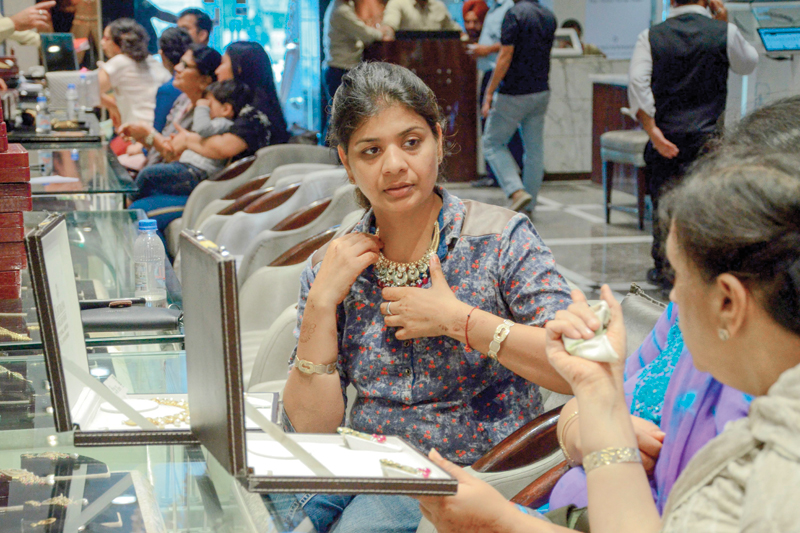

NEW DELHI: The economic slowdown has dimmed the festive mood with jewellers reporting lower sales on Dhanteras day, the most auspicious day ahead of Diwali.
Delhi-based traders’ body Confederation of All India Traders (CAIT) said that business of both gold and silver has registered sharp decline of 35-40 per cent on Friday.
It termed the fall in sales of gold and silver as unprecedented.
Pankaj Arora, Chairman of the Gold and Jewelry Committee of CAIT, said the fewer customers who came to buy gold and silver did so to just keep up with the tradition as the day is considered auspicious.
“Last year, on Dhanteras, about 17,000 kg of gold was sold, which was worth about Rs 5,500 crore, whereas today there was about 6,000 kg of trade across the country which is worth about Rs 2,500 crore,” the CAIT said.
Besides slowdown and subdued consumer sentiment, the prices of the two key precious metals have been very high this time.
While the price of gold was about Rs 32,500 per 10 grams today, the yellow metal was selling for Rs 39,500 per 10 grams at retail outlets. The price of silver was Rs 39,000 per kg last year, it has touched Rs 48,000 per kg this time around.
“About 900 tonnes of gold is imported every year, taking the average of earlier years, it appears that only 400 tonnes of gold will be imported throughout the year which is mainly due to increase in customs duty by the government about four months back,” the traders’ group said, adding the move had encouraged illegal trade.
Pankaj Khanna, MD & Founder, Gem Selections said his firm had witnessed huge increase in silver sale, but gold has been down this Dhanteras.
India has been the key market for gold as a large section of people consider it as the safest investment instrument besides being worn as ornaments.
Besides serving as a store of value, the yellow metal is also looked up to for relief in times of economic or financial distress.
Meanwhile, with thousands of workers painstakingly hand making vast volumes of firecrackers, Sivakasi in southern India is usually at full tilt before Diwali. But due to efforts to curb air pollution, the pyrotechnics epicentre is fizzling out.
In addition to gifts, elaborate feasts and family get-togethers, the Hindu mega-festival of lights, which falls this weekend, has in recent years also meant setting off firecrackers — millions of them.
Their smoke combines with other emissions to turn the air of India’s cities — among the world’s most polluted — into a deadly, sickly yellow cocktail that one study says kills a million Indians prematurely every year.
Just before Diwali last year, India’s top court ruled only “green crackers” that emit fewer pollutants could be used.
Confusion still surrounds the regulations, but signs in Sivakasi district, which in past years supplied 90-95 per cent of India’s firecrackers with revenues of around $800 million, suggest the 2019 blowout will be quieter.
“Usually after Diwali the people come to us and place orders for the next Diwali and even give some advance payment,” said D Mathan, director of Lima Fireworks — one of around 1,000 manufacturers in Sivakasi.
“It didn’t happen this time around,” he said. Production at his company has plunged almost 60 per cent.
The industry is the biggest local job creator, directly or indirectly employing hundreds of thousands of people, many of them uneducated women, churning out boxes of crackers with names like “Napoleon Total War”. Now many don’t know what they will do.
“Some people migrated to other jobs like daily wage labourers, farm labourers and construction workers,” Arvind Kumar, a factory employee in the district in Tamil Nadu state, said.
Many producers switched to manufacturing the “green crackers” after receiving training and assistance from the government. But being more expensive, sales have been slow. G Karuppasamy, 65, a Sivakasi firecracker shopkeeper and wholesaler, said that sales have slumped almost 50 per cent as orders from around India have dried up.
“Authorities talk about pollution but we don’t pollute much compared to others. And one day doesn’t make a difference for the rest of the year,” he said.
“The government shouldn’t clamp down on us. Everyone in a 30-kilometre radius is dependent on this sector. Sivakasi’s existence
isn’t possible without this sector,” he added. — AFP
Oman Observer is now on the WhatsApp channel. Click here



